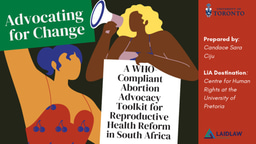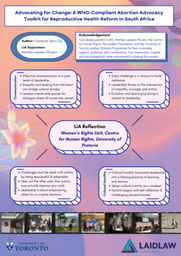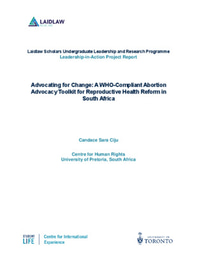LiA Week 1 Log - First Days in Pretoria
About my LiA:
I am working with the Centre for Human Rights at the University of Pretoria’s Faculty of Law in South Africa. The Centre’s Women’s Rights Unit, established in 1993, promotes the rights of women and girls in Africa, primarily through advocacy, research, and training focused on implementing the Maputo Protocol. The Unit also supports the Special Rapporteur on the Rights of Women in Africa and works to strengthen regional mechanisms and gender-sensitive policies.
This year, the Unit published a research paper titled “Aligning South Africa’s Abortion Guideline with WHO Recommendations for Improved Access to Abortion and Self-Managed Abortion.” I aim to support the Centre with the implementation of the report by producing an advocacy toolkit to serve as a resource for NGOs, think tanks, local health centers, and activists to effectively advocate for policy reforms to align the National Clinical Guideline with WHO recommendations, as outlined in the Centre’s 2025 research paper. By equipping stakeholders with key facts, talking points, and actionable strategies, the toolkit aims to support efforts to enhance access to safe and legal abortion services for women and girls in South Africa.
What went well?
I spent my first week meeting the lovely people who work at the Centre for Human Rights. Unfortunately, the team of the Women’s Rights Unit have been on a work trip in the Gambia, so I was only able to meet one person on the team, who introduced me to the other staff at the Centre. I had a fantastic time chatting with the people I am working with, and I think I have already been able to make some long-lasting connections! Since the team have been in Banjul, I have not really been able to start working on my project specifically, but instead of sitting idle, I took this opportunity to familiarise myself with the works of the Centre and to read the five Human Rights Charters, including the Maputo Protocol that the Centre considers as its bread and butter.
What could have been done differently?
One challenge I faced in my first week was the delay in starting my project, despite having a clearly defined project. Although we had already agreed that I would work on an advocacy toolkit to support the implementation of the Centre’s recent report, I chose to wait until I could meet with my supervisor in person before beginning. I wanted to better understand how I could be most useful to the Centre and to ensure that my work aligned closely with her expectations and any updates on the project’s direction. In the weeks leading up to my arrival, the Centre had been engaged in roundtable discussions with South Africa’s National Department of Health and various NGOs about the report’s implementation. My supervisor had kindly shared those conversations via email, and I felt an in-person discussion would help clarify if any shifts were needed in the development or direction of the toolkit. In hindsight, I could have improved my communications approach by reaching out earlier to confirm the structure of my first week and communicate my intentions more clearly. That said, my supervisor was incredibly helpful and ensured I had meaningful tasks to work on, even while she was away, which made for a smooth start overall.
What did I learn about myself when working with others?
In my first week, I haven’t yet had the chance to work in a team setting in a formal sense. However, I did engage in a few enriching discussions with colleagues about the Centre’s work and broader themes such as abortion rights and women’s experiences across African countries. These conversations were particularly insightful, as they allowed me to draw parallels between the experiences of women in Africa and those in India and Canada. While many challenges are shared across these contexts, I also learned that some experiences are uniquely shaped by South Africa’s social, cultural and historical past presents.
What did I learn about leadership?
Growing up within Indian culture, I was used to formal titles and strict hierarchical structures in leadership and organizational settings. It was common to address superiors as "Sir" or "Ma’am," and to maintain a clear boundary between roles. When I moved to Toronto, I noticed a shift. While hierarchies still existed, they were more relaxed, and people often addressed their superiors as Mr. or Ms., which already felt less rigid.
At the Centre for Human Rights in South Africa, I encountered an even more open structure. Out of habit, I initially referred to colleagues and superiors as “Miss (last name)” or “Ma’am,” but I was quickly encouraged to use first names (no prefixes even!), regardless of position. This approach was new to me, but I grew to appreciate it. It created a sense of closeness and made it easier to collaborate. I felt more like a valued member of a team working toward a shared goal, rather than someone operating under a distant authority figure. I now firmly believe that leadership does not need to be reinforced by formality or titles. It is better expressed through mutual respect, accessibility, and a commitment to collective progress.
What do I want to develop or focus on next?
I am excited to begin the main portion of my work starting next week, especially now that I feel more confident after familiarizing myself with the Centre’s report and a wide range of legal codes and literature related to South Africa’s abortion policy. Professionally, I’m eager to dive deeper into the advocacy work and contribute meaningfully to the Centre’s ongoing efforts. On a more personal level, one of my goals has been to connect with other students and attend events at the University of Pretoria. However, I’ve found it somewhat challenging to approach people and initiate conversations on campus. In the coming week, I hope to push myself out of my comfort zone, attend more campus events, and take steps toward building new friendships.



Please sign in
If you are a registered user on Laidlaw Scholars Network, please sign in